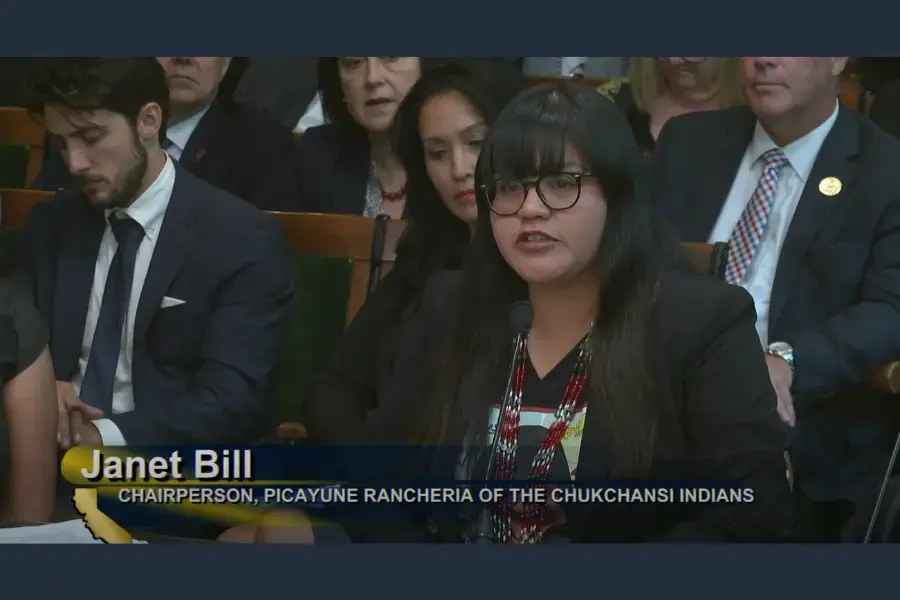CSU Faces Accountability over Mishandling of Ancestral Remains and Cultural Items
As Native American Heritage Month comes to a close, co-chairs of the Native American and Indigenous Peoples Caucus Leece Lee-Oliver and Sandy Dixon invite CFA members to enhance their awareness of the desecration that the CSU is responsible for.
During an emotionally demanding late August legislative hearing, the CSU was reprimanded for disregarding the 2001 California Native American Graves Protection and Repatriation Act (CalNAGPRA) for over three decades.
CalNAGPRA was passed in response to the slow pace of repatriation in compliance with the federal law, NAGPRA. CalNAGPRA was designed to close loopholes in the federal statute and allow tribes to claim ancestral remains regardless of whether they have federal recognition.
The hearing was co-chaired by Assembly Members David Alvarez and James Ramos. Ramos, a member of the Cahuilla tribe, has authored several bills to hold public universities accountable under NAGPRA. On October 10, Ramos’ bill AB 389 was signed into law. The bill prohibits CSU from using any Native American ancestors or cultural belongings in teaching or research.
“Our ancestors are not some trophies to be highlighted in a classroom,” Ramos said at the hearing. “Now is the time that California’s First People and the issue of repatriation starts to move to the No. 1 priority of the California State system.”
The state audit findings and recommendations, published June 29, reveal that at least 21 of CSU’s 23 campuses possess nearly 700,000 sacred artifacts. The audit team conducted on-site reviews at four sites: Chico State University, Sacramento State University, San Diego State University, and San José State University.
Key findings from the audit included:
- Twelve of the 21 CSU campuses with collections have not finished the reviews required by CalNAGPRA, and 16 campuses have little or no repatriation activities.
- Only 6 percent of artifacts have been returned.
- Two campuses returned remains to tribes without following NAGPRA requirements for consulting with and notifying other tribes, and six campuses violated CalNAGPRA by handling collections without consultation.
- Campuses lack the policies, funding, and staff to support repatriation efforts.
- Sonoma State, with more than 185,000 artifacts, is identified as having more than any other campus, but has repatriated less than 1 percent of its collection.
Tribal Council Chairperson for the Picayune Rancheria of the Chukchansi Indians Janet K. Bill stated that “our tribe fully expects CSU to consult with us due to the cultural genocide, forced removal, boarding school era, and all other assimilation policies that caused our people and cultural items to be removed and redistributed across the state of California.”

The auditor’s report calls for every CSU campus to finish their inventory reviews by December 2024, and calls on the Chancellor’s Office to create a systemwide policy establishing consistent repatriation practices and staff training requirements in consultation with California tribes and the Native American Heritage Commission.
The report explained that only five campuses have full-time repatriation coordinators. The audit report identified 15 campuses needing these positions. All campuses may need to fill the position in the future. Depending on collection size, most campuses require additional staffing resources than currently positioned.
California State Auditor Grant Parks argued that some of the CSU’s $700 million in reserves should be used to comply with the timeline, proper consultation with tribes, and posting notices in the Federal Register as required in CalNAGPRA.
The evaluation of the CSU’s compliance with CalNAGPRA was a response to San José State Professor Elizabeth Weiss who posed with the skull of a Native American person and posted the photo on X (formerly known as Twitter) with the caption “So happy to be back with some old friends.” Weiss claimed that repatriation promotes “superstition over science.” In June, Weiss agreed to work off-campus and resign the following May.
By June 2022, the state Joint Legislative Audit Committee (JLAC) announced a systemwide audit of the CSU’s legal compliance with the federal Native American Graves Protection and Repatriation Act of 1990 (NAGPRA) and CalNAGPRA.
Former CSU Interim Chancellor Jolene Koester was absent from the meeting. Instead, CSU Fullerton Interim President Sylvia Alva spoke on behalf of the Chancellor’s Office. Alva announced that CSU San Bernardino President Tomas Morales agreed to serve as the presidential advisor to the office to ensure that CSU presidents are actively pursuing repatriation.
The CSU is not alone; the audit echoed similar findings last year at the University of California.
Key recommendations from the audit report included in AB 389 are:
- Monitoring campus efforts to review their collections and require the completion of tribal outreach and consultation by December 31, 2025,
- Ensuring that campuses have protocols regarding handling and identifying ancestral remains and cultural items,
- Issuing a system-wide NAGPRA policy establishing consistent repatriation processes and training requirements, and,
- Requiring campuses with more than 100 sets of ancestral remains or cultural items to have full-time experienced repatriation coordinators.
“AB 389 will ensure that decades after a federal and state requirement to repatriate the remains of our ancestors, CSU takes this responsibility seriously. These bones are the remains of our ancestors and deserve respectful reburial. It is a fundamental human right to be buried according to the customs of one’s people. I know of no other group denied this right,” Ramos said.
For information on CalNAGPRA campus and systemwide contacts go here. For more background go here.
Join California Faculty Association
Join thousands of instructional faculty, librarians, counselors, and coaches to protect academic freedom, faculty rights, safe workplaces, higher education, student learning, and fight for racial and social justice.